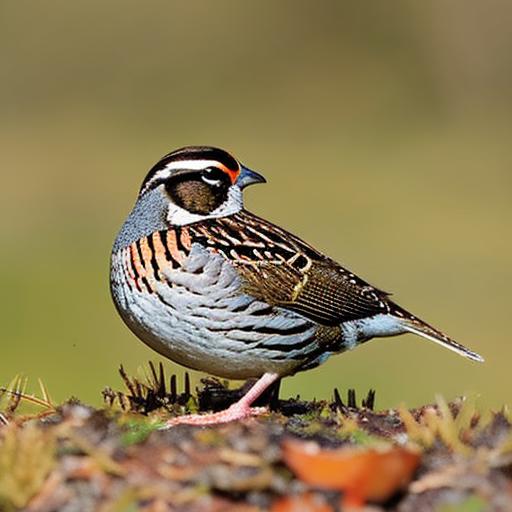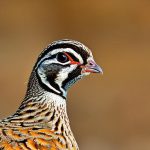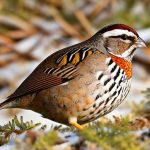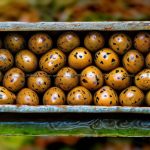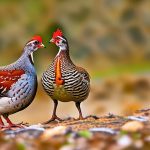Winterizing your quail coop is essential to ensure the health and well-being of your quail during the colder months. One of the first steps in winterizing your quail coop is to insulate the coop to help retain heat and keep the cold out. This can be done by adding insulation to the walls and ceiling of the coop. Additionally, sealing any drafts or gaps in the coop will help prevent cold air from entering and warm air from escaping. This can be achieved by using weather stripping or caulking around windows, doors, and any other openings in the coop.
Another important aspect of winterizing your quail coop is to provide adequate bedding for your quail. Deep bedding made of materials such as straw, hay, or wood shavings can help provide insulation and warmth for your quail. It also helps to absorb moisture and provide a comfortable environment for your birds. Additionally, providing extra bedding during the winter months can help keep your quail warm and comfortable. It’s important to regularly clean and replace bedding to maintain a healthy and hygienic environment for your quail.
Key Takeaways
- Winterizing your quail coop is essential to protect your birds from harsh weather conditions and ensure their well-being during the colder months.
- Providing adequate shelter is crucial for quails to stay warm and dry, so make sure your coop is well-insulated and free from drafts.
- Ensuring proper ventilation is important to prevent moisture buildup and maintain good air quality inside the coop.
- Implementing heating solutions such as heat lamps or heated pads can help maintain a comfortable temperature for your quails during winter.
- Offering nutritious feed with added protein and fat will help quails maintain their body condition and stay healthy during the winter months.
- Keeping water from freezing is crucial, so consider using heated waterers or checking water sources frequently to prevent dehydration.
- Monitoring health and behavior is important to catch any signs of illness or distress early on, so keep a close eye on your quails and address any issues promptly.
Providing Adequate Shelter
Providing adequate shelter for your quail during the winter months is crucial for their survival and well-being. One way to provide shelter for your quail is to ensure that the coop is well-constructed and secure. This means checking for any damage or weak spots in the coop and repairing them before winter sets in. Additionally, providing a windbreak, such as a tarp or plastic sheeting, on the outside of the coop can help protect your quail from harsh winds and cold temperatures.
Another important aspect of providing adequate shelter for your quail is to offer them a covered area where they can seek refuge from the elements. This can be achieved by adding a covered run or enclosed area to the coop where your quail can go to escape from rain, snow, and wind. Providing roosting bars or platforms inside the sheltered area can also help keep your quail off the cold ground and provide them with a comfortable place to rest. It’s important to ensure that the sheltered area is well-ventilated to prevent moisture buildup and maintain a healthy environment for your quail.
Ensuring Proper Ventilation
Ensuring proper ventilation in your quail coop during the winter months is essential for maintaining good air quality and preventing moisture buildup. Proper ventilation helps remove stale air, ammonia, and excess moisture from the coop, which can lead to respiratory issues and other health problems for your quail. One way to ensure proper ventilation in the coop is to install vents or windows that can be opened and closed as needed to regulate airflow. This allows you to adjust ventilation based on the weather conditions and temperature inside the coop.
Another important aspect of ensuring proper ventilation is to avoid overcrowding in the coop, as this can lead to poor air quality and increased moisture levels. Providing adequate space for your quail and avoiding overcrowding can help maintain good ventilation and prevent respiratory issues. Additionally, regularly cleaning the coop and removing soiled bedding can help reduce ammonia levels and improve air quality. It’s important to monitor the ventilation in the coop regularly and make adjustments as needed to ensure a healthy environment for your quail.
Implementing Heating Solutions
Implementing heating solutions in your quail coop can help keep your birds warm and comfortable during the winter months. One way to provide heat in the coop is by using heat lamps or infrared bulbs. These can be installed in the coop to provide supplemental heat and keep the temperature at a comfortable level for your quail. It’s important to place heat lamps or bulbs in a safe location where they won’t come into contact with bedding or other flammable materials.
Another heating solution for your quail coop is to use heated perches or pads. Heated perches provide a warm surface for your quail to roost on, while heated pads can be placed under bedding to provide warmth from below. These heating solutions can help prevent frostbite and keep your quail comfortable during cold weather. It’s important to use heating solutions designed specifically for poultry to ensure safety and effectiveness.
Offering Nutritious Feed
Offering nutritious feed to your quail during the winter months is essential for maintaining their health and well-being. Cold weather can increase the energy requirements of quail as they work harder to stay warm, so it’s important to provide a high-quality feed that meets their nutritional needs. This can include a commercial game bird feed that is formulated specifically for quail, as well as supplemental treats such as mealworms, fruits, and vegetables.
Another important aspect of offering nutritious feed is to ensure that your quail have access to fresh water at all times. In addition to their regular feed, providing access to clean water is crucial for maintaining hydration and overall health. It’s important to regularly check water sources for freezing and provide heated waterers or regular water changes to prevent dehydration.
Keeping Water from Freezing
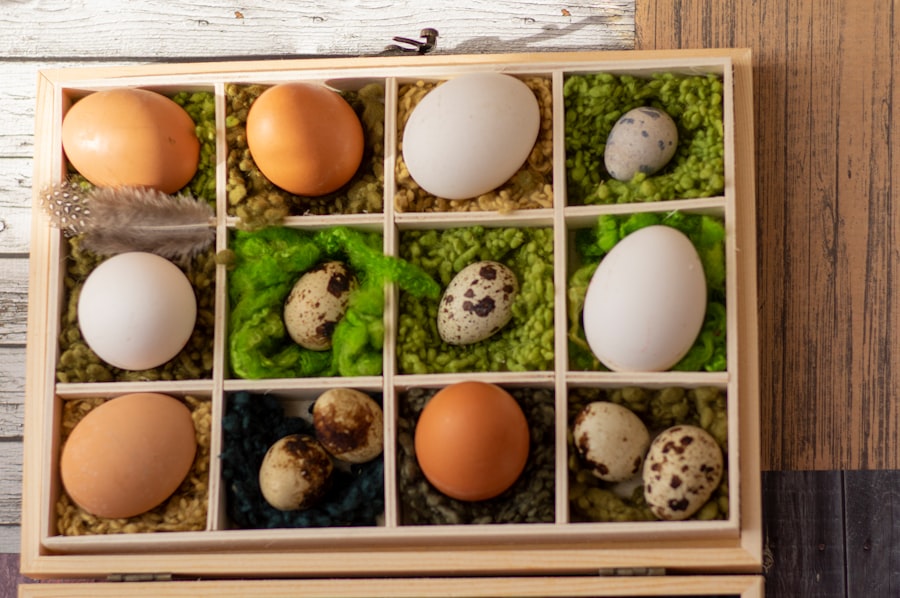
Keeping water from freezing in your quail coop during the winter months is crucial for ensuring that your birds have access to clean water at all times. One way to prevent water from freezing is by using heated waterers specifically designed for poultry. These heated waterers are equipped with a thermostat that prevents water from freezing and ensures that your quail have access to fresh water even in cold temperatures.
Another method for keeping water from freezing is by using insulated water containers or placing waterers in a sheltered area within the coop. Insulated containers help retain heat and prevent water from freezing, while placing waterers in a sheltered area can provide some protection from cold temperatures and wind. It’s important to regularly check water sources for freezing and make adjustments as needed to ensure that your quail have access to clean water throughout the winter.
Monitoring Health and Behavior
Monitoring the health and behavior of your quail during the winter months is essential for identifying any issues early on and providing necessary care. It’s important to regularly observe your quail for signs of illness, injury, or distress, such as lethargy, decreased appetite, or abnormal behavior. Additionally, checking for any changes in their physical appearance, such as puffed-up feathers or frostbite on their combs and feet, can help identify potential health issues.
Another important aspect of monitoring health and behavior is to regularly handle your quail to check for any abnormalities or injuries. This allows you to assess their overall condition, check for any signs of illness or injury, and provide necessary care as needed. It’s also important to keep an eye on their egg production and quality, as cold weather can impact egg production and fertility. By monitoring the health and behavior of your quail regularly, you can ensure that they receive proper care and attention throughout the winter months.
In conclusion, winterizing your quail coop is essential for ensuring the health and well-being of your birds during the colder months. By providing adequate shelter, ensuring proper ventilation, implementing heating solutions, offering nutritious feed, keeping water from freezing, and monitoring health and behavior, you can create a comfortable and healthy environment for your quail throughout the winter months. With proper care and attention, you can help your quail thrive even in cold weather conditions.
When it comes to keeping quail outside during winter, it’s essential to provide them with a suitable coop that offers protection from the cold weather. A well-designed coop, such as the Chicken Coop Chester SC or the Producers Pride Sentinel Chicken Coop, can help ensure that your quail stay warm and safe during the colder months. Additionally, understanding the specific needs of your quail and implementing appropriate measures can make a significant difference in their well-being. For more insights on creating a suitable environment for your poultry, check out this related article on poultrywizard.com.
FAQs
What are some important considerations for keeping quail outside in winter?
Quail need protection from harsh weather conditions, such as wind and snow, and access to fresh water and food. It’s important to provide adequate shelter and insulation to keep them warm.
What type of shelter is suitable for quail in winter?
A well-insulated coop or shelter with proper ventilation is essential for keeping quail warm in winter. It should be draft-free and provide protection from snow and wind.
How can I ensure my quail have access to fresh water in winter?
To prevent water from freezing, use heated waterers or check water sources frequently to ensure they don’t freeze over. It’s important for quail to have access to fresh water at all times, even in winter.
What should I feed my quail in winter?
Quail should be provided with a balanced diet that includes high-quality feed and access to grit for digestion. It’s also beneficial to offer additional protein sources, such as mealworms, during the winter months.
Are there any health concerns for quail in winter?
Quail are susceptible to respiratory issues in cold, damp conditions, so it’s important to keep their living environment clean and dry. Additionally, monitoring for signs of frostbite on their combs and feet is important in colder temperatures.
Meet Walter, the feathered-friend fanatic of Florida! Nestled in the sunshine state, Walter struts through life with his feathered companions, clucking his way to happiness. With a coop that’s fancier than a five-star hotel, he’s the Don Juan of the chicken world. When he’s not teaching his hens to do the cha-cha, you’ll find him in a heated debate with his prized rooster, Sir Clucks-a-Lot. Walter’s poultry passion is no yolk; he’s the sunny-side-up guy you never knew you needed in your flock of friends!

